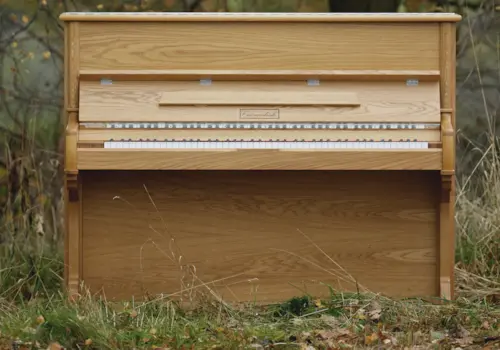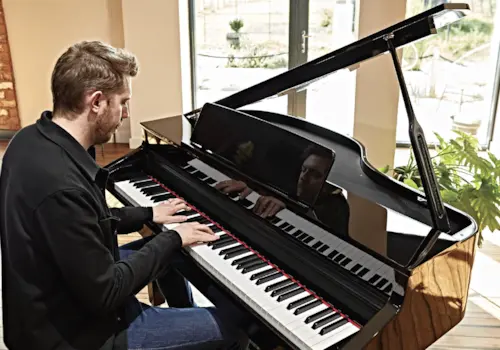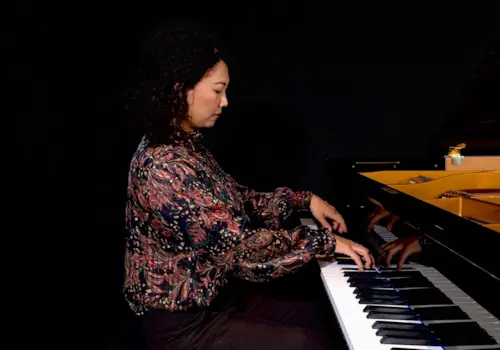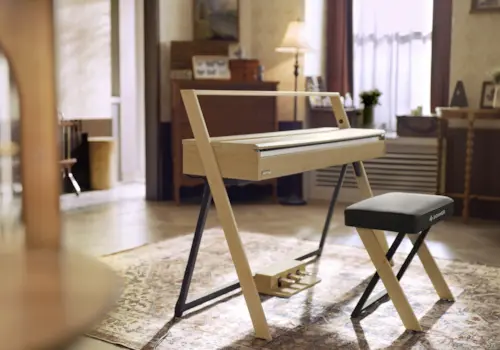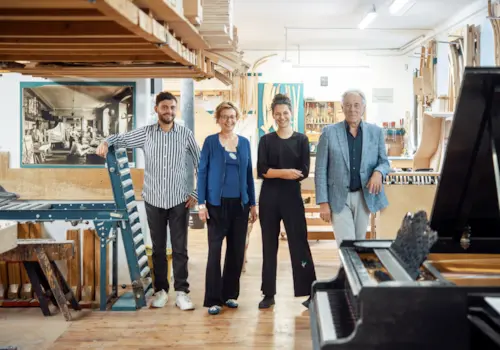Co-Founder & Director of The Curious Piano Teachers, Sharon Mark-Teggart, talks us through how to embrace the fact that vulnerability is good for us
When did you last feel like you weren’t good enough? What triggered the feeling?
In her TED Talk, researcher and storyteller Brené Brown shares profound insights from her painstaking research into what she calls ‘human connection’. I’ve watched the video several times now. Her take on this feeling of inadequacy, of 'I’m not good enough', is not only powerful – it’s deeply encouraging. You can watch it below.
- Being disconnected can feel ‘safe’
- Being connected can feel ‘exposed’
Since I started teaching piano – back in 1997 – I’ve been aware that I’ve chosen a profession that tends to be more disconnected, than connected. It’s something I’m curious about. And Brené’s TED Talk has fuelled my curiosity further.
I mean, we do so much in isolation. It’s easy, it’s effortless to be ‘disconnected’. The fact is that the deliberate act of being ‘connected’ can place us in situations where there’s a far greater chance of being exposed. Despite investing hugely in my own learning – both in terms of time and finance – and despite having a lot of experience, I sometimes still feel like a fraud. Not with everything I do. Rather with certain areas of what I do. Yet that’s enough to eclipse the things I feel I can do.
Have you ever had a day where that one little niggly thing, that made you feel small, overshadowed ten other good things? I had one of those days earlier this week.
So here’s what I’m saying. If you fear even the smallest things – which, notice, rarely feel like small things – know that you’re not alone.
The responsibility I feel as director and co-founder of The Curious Piano Teachers is pretty overwhelming. It was one thing to visualise the potential of an online membership site – offering training, support and resources to piano teachers around the world – from the comfort of a coffee shop overlooking the Irish Sea. (Romanticising stuff is bliss!) Yet it’s something totally different when it comes to the doing:
- Creating videos of my teaching to present to piano teachers around the world – you have no idea how much that’s scared me
- Presenting teaching ideas to camera – surprisingly more daunting than doing it live because, yes, there’s the possibility to re-watch and nit-pick!
- Creating bespoke resources – what will piano teachers think? Is this a rubbish idea?
- Being exposed on live webinars and periscope – did you know that my first webinars were entirely scripted?
- Writing blogs and articles – just like this one
So yes, the doing is definitely more onerous than glamorous. I love it. Really I do. But it’s not easy. I do feel very exposed. Yet I’m learning so much, I’m constantly developing. And what used to feel scary, becomes less scary too.
The fear of disconnection

In her ground-breaking research, Brené asked people about connection. Yet – get this, because this is fascinating – what she got were stories about disconnection: the fear of disconnection.
‘Is there something about me that – if other people know or see – will lead to me being unworthy of connection?’
Oh my goodness! How many times have I felt like this? How many times have I dreaded messing up? How many times have I literally felt the fear of being exiled from my profession? Dramatic maybe. Yet when I feel ‘I’m not good enough’ there is this tendency to go into overdrive. Does that make sense?
I have no idea how many of you this article will resonate with. It doesn’t really matter.
Just know that – if you’ve ever felt like you’re not good enough as a pianist or piano teacher – I’m writing this with you in mind. Because after all these years, I still feel vulnerable. I even feel vulnerable for admitting that I feel vulnerable.
The fear of ‘not being worthy’ of connection

Brené suggests that our fear of not being worthy of connection is what stops us from connecting. And I get that. I remember taking the plunge in 1998 and heading off, by myself, to my first-ever seminar feeling excited (20%) and terrified (80%).
EXCITED about learning new stuff, excited about the prospect of expanding my – very limited – teaching skills. (And yes, a little curious too!)
TERRIFIED that someone would ask me to do something I couldn’t do, or respond to something I was supposed to know about.
Every year since then, I’ve worked hard. Hard I’ve pushed myself further than I thought it was possible to go. Yet still I see my journey stretching ahead. There is still so much to learn. So much I want to (need to) develop. And hear me when I say this: I still have those days when my sense of love and belonging in this profession is like a helium-filled balloon that has escaped my grasp.
How ‘worthy’ of belonging do you feel?

Brené’s research revealed that people who have a strong sense of belonging also believe that they’re worthy of belonging.
But there’s more. It would seem that people who have this sense of worthiness also possess these three characteristics:
1. COURAGE
The courage to be imperfect
2. COMPASSION
Be kind to yourself, then you can be kind to others
3 CONNECTION
Be willing to let go of who you think you should be
Honestly? I think I need to nurture my sense of worthiness. Because, for me, it seems like such a lot of what I do hinges on the ‘who I think I should be.’ How about you?
'Excruciating vulnerability'
Brené suggests that the underpinning element – of this I’m not good enough feeling – is vulnerability. In fact, she describes it as ‘excruciating vulnerability.’
Yet in order for connection to happen, we have to allow ourselves to be seen. And gosh. That’s hard. Really hard. I realise just how much I’ve suffered from ‘excruciating vulnerability’ throughout the year.
Brené describes vulnerability as ‘the core of shame and fear and our struggle for worthiness.’ Yet she claims that vulnerability is also ‘the birthplace of joy, of creativity, of belonging and of love.’
Let’s do this together
So together, let’s embrace – rather than numb – the vulnerability that each of us feel. None of us are perfect. Whether you’ve been teaching for two months, two years or over 20 years; whether you have no teaching qualifications or a PhD: it’s always going to be easy to fill in the blank: ‘I should be better at __________ .’
Come and nurture your sense of belonging, you are a vital cog in our piano teaching profession. We need you to connect. You are unique. And as you develop you will bring depth and richness to what the rest of us do. (And yes, it’s ok to doubt that right now. But trust me, you will enrich the profession when you come to it and allow yourself to be seen).
The secret is in getting started – in taking action steps – because as Henry Ford once said: ‘You can’t build a reputation on what you’re going to do.’
About the author:
Sharon Mark-Teggart is the Co-Founder & Director of The Curious Piano Teachers. She has 18 years of piano teaching experience. She has additional experience of teaching music at tertiary level and has also worked for several years within early years settings as a music practitioner. She did a 3 year postgraduate course at the Institute of Education, University of Reading, achieving a Masters in Music Education with distinction in 2007.

